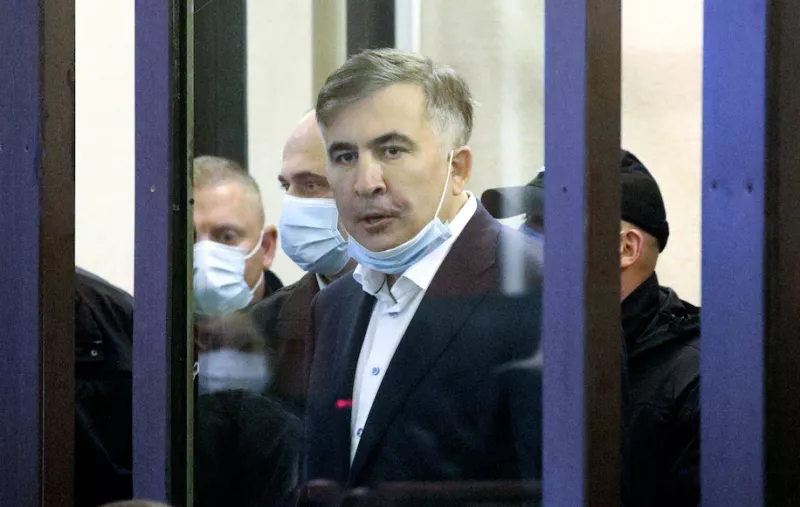
In August 2008, as Russian tanks advanced through Georgia’s sovereign territory and headed toward the capital, Tbilisi, President George W. Bush announced that he was mounting a U.S. military airlift to Georgia under the banner of “humanitarian assistance.” Those U.S. Air Force planes, once on the ground in Tbilisi, never took off again. If Vladimir Putin wanted to take Tbilisi, he was going to have to go through the United States. Secretary of State Condoleezza Rice traveled to Tbilisi to help secure a truce. This mix of military pressure and diplomacy worked. Putin halted his advance.
The capital city and Georgia’s young democracy were saved. But the West has forgotten this history and its lessons, Georgia’s president at the time, Mikheil Saakashvili, told me from his prison cell.
In 2022, Putin is again waging war on a former Soviet republic, trying to stop it from joining not just NATO and the European Union but also the community of free and open societies. This time, the victim is Ukraine, a country with about 10 times the size and population of Georgia and bordering several European states. But even though Putin is running the same playbook he used in 2008, on a bigger scale, the West is again falling for Putin’s scheme and therefore failing to properly confront his aggression.
Saakashvili hasn’t been able to remind us of these lessons — even though he’s also a Ukrainian citizen who once served as governor of the Ukrainian region of Odessa and is still an adviser to Ukrainian President Volodymyr Zelensky. The reason is that Saakashvili has been imprisoned in Georgia since October, when he returned home and was promptly arrested by the government now controlled by his political enemies.
He is now on a hunger strike to protest his treatment in prison (which Amnesty International has called “not just selective justice but apparent political revenge”). But Saakashvili answered my interview questions on Wednesday on handwritten notes passed through his lawyer.
“The lessons of 2008 are that [using] only sanctions cannot stop Putin. He needs to see a credible threat of a military force,” Saakashvili wrote, noting that Putin backed down only after the U.S. Navy sailed into the Black Sea and the U.S. Air Force was placed on high alert.
The circumstances in Ukraine are different. Nobody is arguing today to put U.S. troops on the ground in the middle of Russia’s brutal attack. The point is that Putin understands only the language of security risk and reward. Showing military strength in a calculated way can get him to back down. Taking such moves off the table for fear of provoking him leads only to more aggression.
“Another lesson was that it’s always counterproductive to share the blame and go after the victims,” Saakashvili wrote.
Many blamed Georgia (and Saakashvili specifically), at least in part, for the 2008 conflict. And after the guns went silent, the West turned away. The incoming Obama administration pursued a “reset” with Moscow that included giving Tbilisi the cold shoulder. But Putin didn’t stop trying to take control of Georgia; he just switched tactics. The Kremlin’s oligarch proxies have kept Georgian democracy endemically corrupt and dysfunctional, the way Putin wants it.
Today, some prominent voices in the United States are blaming the Ukraine crisis on the Ukrainians, or NATO, or the United States, for refusing to honor Putin’s ahistorical and blinkered claims that he alone has the right to dictate Ukraine’s future. This plays into Putin’s narrative that he is attacking Ukraine because of Western encroachment, the same lie he told to justify attacking Georgia.
“The major mistake is to have any illusion that you can make a reasonable deal with Putin,” said Georgian politician Giga Bokeria, Georgia’s national security adviser from 2010 to 2013. “Putin’s goal is to annihilate the Euro-Atlantic order. So, you cannot have a deal; you can only oppose and defeat his plan.”
While sanctions on Putin, his kleptocracy and the Russian economy are good and necessary, they were never going to deter Putin on their own, Bokeria said. The only way to deter and roll back Putin’s aggression now is to support the front-line states he is attacking, with real and long-term security, diplomatic and economic assistance.
The echo of 2008 is ringing loudly today in the minds of Ukrainians, who feel abandoned by a West that had promised them security guarantees while they attempted to build a democratic, pluralist, European state.
“If the West had replied with a very strong reaction against Russia invading Georgia back in 2008, we would not have had the other Ukraine invasion in 2014, and then today would never happened,” said Ukrainian member of parliament Lisa Yasko, who told me she woke up on Thursday morning in Kyiv to the sound of explosions.
The history of 2008, 2014 and now 2022 should make clear that, for Putin — like all militaristic, expansionist dictators — the appetite grows with the eating. Ukrainians are the ones fighting him today, and they need more help. If we fail, history shows, Putin’s next aggression will be bigger and closer to home.
Josh Rogin is a columnist for the Global Opinions section of The Washington Post. He writes about foreign policy and national security. Rogin is also a political analyst for CNN. He previously worked for Bloomberg View, the Daily Beast, Foreign Policy, Congressional Quarterly, Federal Computer Week and Japan's Asahi Shimbun newspaper.
